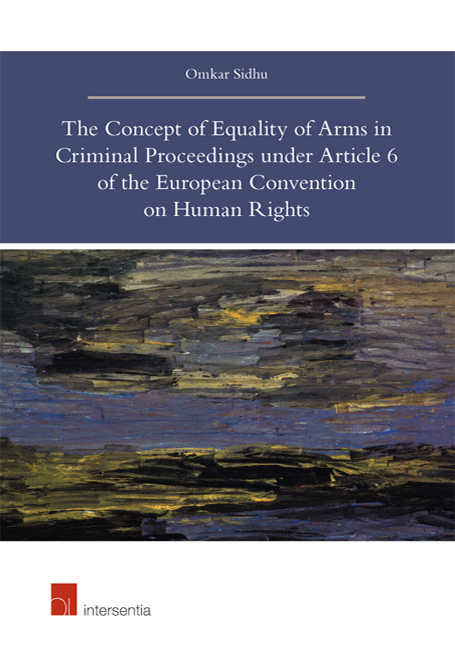Book contents
- Frontmatter
- Contents
- Introduction
- Chapter 1 A Background for Article 6
- Chapter 2 Equality of Arms
- Chapter 3 Equality of Arms and the Right to Challenge and Call Witness Evidence
- Chapter 4 Equality of Arms and the Right to Adequate Time and Facilities
- Chapter 5 Equality of Arms and the Right to Legal Assistance
- Concluding Overview
- Bibliography
- List of Cases
- List of Legislative Instruments
Chapter 3 - Equality of Arms and the Right to Challenge and Call Witness Evidence
Published online by Cambridge University Press: 19 September 2018
- Frontmatter
- Contents
- Introduction
- Chapter 1 A Background for Article 6
- Chapter 2 Equality of Arms
- Chapter 3 Equality of Arms and the Right to Challenge and Call Witness Evidence
- Chapter 4 Equality of Arms and the Right to Adequate Time and Facilities
- Chapter 5 Equality of Arms and the Right to Legal Assistance
- Concluding Overview
- Bibliography
- List of Cases
- List of Legislative Instruments
Summary
INTRODUCTION
A failure to challenge adverse witness evidence is tantamount to tacit acceptance of such evidence as truth. It is imperative, therefore, that opportunities exist for such evidence to be tested and for favourable witness evidence to be admitted. To this effect, Article 6(3)(d) grants the accused in criminal proceedings the right ‘to examine or have examined witnesses against him and to obtain the attendance and examination of witnesses on his behalf under the same conditions as witnesses against him.’
This chapter considers the Court's approach to equality of arms in the light of Article 6(3)(d). The requirement in the latter of equal conditions is one of several aspects evidencing a strong nexus with the concept of equality of arms and this relationship is explained in section 2. Identified in sections 3 and 4 are those who fall into the category of witness or of examiner respectively as Article 6(3)(d) provides no express definition thereof. With such terms defined, analysis of the right to question adverse witnesses predominates the remainder of the chapter, for this component of Article 6(3)(d) engages the foremost attention of the Court. This analysis begins in section 5 by outlining an examination model that is a benchmark of compliance with Article 6(3)(d) and serves as a point of reference for the subsequent discussion on derogations therefrom. The Court accepts that this model may be legitimately derogated from in exceptional cases without occasioning a violation. It has done so principally out of concern for the safety and well-being of victims and witnesses and their ability to testify freely, an interest now acknowledged widely as one of those to be accommodated in criminal proceedings. The Court must, therefore, balance a ‘triangulation of interests’ between the accused, the prosecution (representing the societal interest in the administration of justice), and victims and witnesses. Whereas victims and adverse witnesses are not opponents as defined in the concept of equality of arms, the accommodation of their interests can place the prosecution, which relies upon their testimony, in a position of procedural advantage over the accused. Section 6, accordingly, discusses the Court's approach to the concept of equality of arms within the context of derogations from the benchmark examination model.
- Type
- Chapter
- Information
- The Concept of Equality of Arms in Criminal Proceedings under Article 6 of the European Convention on Human Rights , pp. 117 - 164Publisher: IntersentiaPrint publication year: 2017

